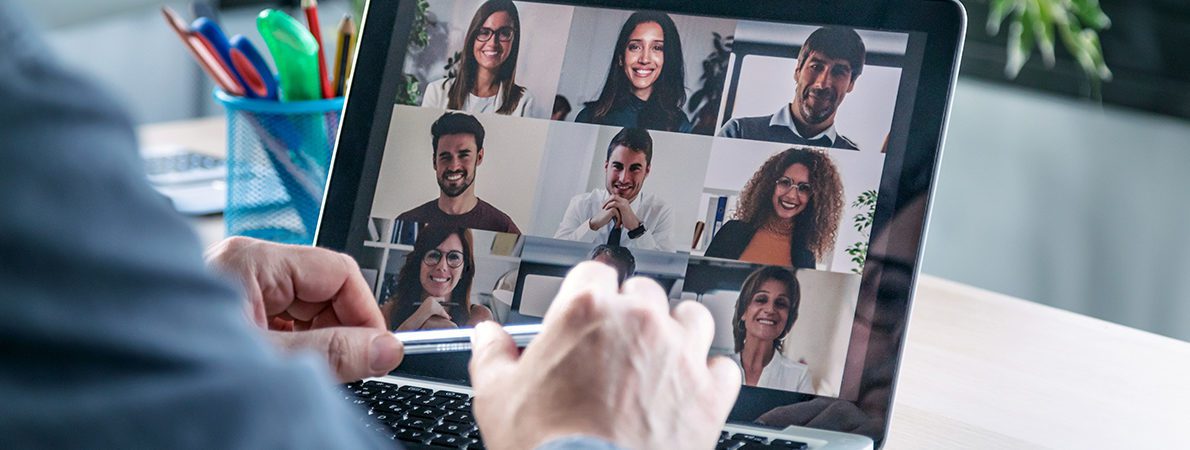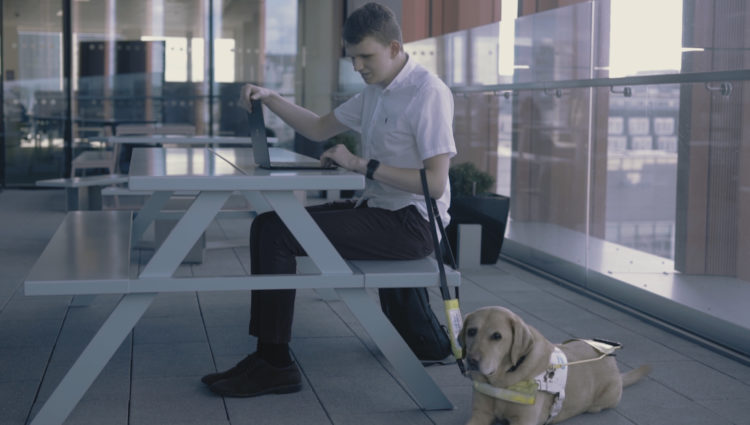Many of us have had to adapt to working from home in 2020, and the shift has been challenging for a lot of people. With a winter lockdown in full force it’s especially important now to keep motivated and productive.
We caught up with TPT colleagues Alex Henderson, Ashfaq Azim and Kevin Satizabal, who are visually impaired themselves, to discuss how they’ve been finding working from home and what tips they have for blind and partially sighted people in a similar position.
Pros and cons of working from home
“I miss the energy you get by being with other people. Those interactions and ideas you get by being in the office with colleagues – you can’t recreate that on Zoom.”
Alex said when discussing what he misses about going into the office.
On the plus side for Alex, he said he prefers his home office set up: “I have a bigger screen that I can plug my laptop into and I can control the light – which does make a big difference.”
Alex has a genetic condition called cone dystrophy which developed when he was around nine years old. He does his job with assistive technology Zoomtext Fusion, which offers screen magnification and screen reading.
Ashfaq is the Impact and Evaluation Manager at TPT. He feels he is probably one of the lucky ones, as there isn’t too much difference between his equipment at home and what he uses in the office.
He said: “For me it’s much the same setup. The main adjustment I have on my laptop is high contrast settings, which makes it a lot easier to read text and causes less strain on my eyes. The right lighting is also incredibly important.” Ashfaq’s sight condition is retinitis pigmentosa – a condition that progressed in his 20s.
Kevin is well-versed at working at home – his last role at LOOK UK was home-based. He is now the Sight Loss Council’s Communications Officer. Kevin’s eye condition is retinopathy of prematurity. He said
“I like that it’s quiet, it means I can listen to JAWS easily; I can really focus. In the office it’s easy to get distracted by the sounds around you and I didn’t like wearing headphones.”
However, there are areas of his job that he can’t do now: “I do miss the direct communication elements of my job – going out to events and being able to promote our work in person”.
Ashfaq feels the negative aspects of working from home for him are to do with the restrictions of the pandemic, but that this wouldn’t be an issue in the future. He said that, for him, the restrictions outweigh the benefits: “At 5pm you’re ready to start your evening but because of the pandemic, there is little do in my free time.”
He added: “For me being able to exercise is really important and has helped my mental health.”
Get yourself in a routine
Whether routines come naturally to you or not, there is no arguing that they are good for us. Implementing a routine to your day can give you a sense of control. It can also improve your focus, organisation and productivity.
These aspects resonate with Kevin: “I think routine is important for me as me it focuses the mind. If I don’t start work at the same time, I find it difficult to get into gear.”
Alex added: “I can’t start the day unless I’ve had a shower and breakfast. I’ll get dressed like I am going into the office. It helps to draw a line between the day. I don’t think getting up and sitting straight at the desk would work for me.”
A ‘to-do’ list keeps you focused
For Kevin, creating a to-do list was invaluable for managing his work and helping him feel he was on top of things: “When I first started in my last job, I found it hard to just start the work some days. I wanted to do the work but found it quite overwhelming. Creating a to-do list for priorities and projects keeps you focused.”
Alex felt the same: “I’d be totally lost without my to-do list. There are times you can feel you’re being pulled in different directions. One of my little strategies is have a folder in my Outlook labelled ‘to-do’. Then I can just add any emails to this. It lets my brain know I’ve handled it and I can pick it up again when needed.”
Meanwhile, Ashfaq’s top tip for feeling productive and avoiding procrastination is to “Just start something, anything – once you’ve made a start it feels so better. Just write something, even if it is two words. Then before you know it you’ve got yourself into the workflow.”
There are lots of free online tools that can help to keep you motivated and maximise productivity, such as Todoist, ToodleDo and ClickUp.
Advice for any blind and partially sighted people
There are several things you can do in your day which will help both your productivity and mental wellbeing. This is particularly important in the winter months when daylight is limited.
Ensuring you get out for a short walk at lunch will break up the day and give you a boost. There aren’t as many natural breaks as you would have in the office so routines like this are an important way of creating them.
Kevin’s key advice is to minimise all distraction.
He said: “Lock away those distractions. For me being distracted by notifications just disrupts my flow.”
Separation of workspace and home space, where possible, is important too. Kevin’s advice is: “Have a set place where you work. You work there then you leave at the end of the day. Psychologically it separates your work and home life”
Ashfaq added: “I live alone, but I’ve still made a conscious effort not to have my desk in the lounge. It helps me to keep my work away from where I spend the rest of my time.”
The shift from office to home working has provided many of us with challenges as we struggle to adapt to the new working environments, we find ourselves in. But there are some fairly simple steps we can take to help meet these challenges. These include: keeping to a routine where possible; using to-do lists to both keep your workload manageable and to keep you feeling productive; taking plenty of short breaks away from your desk to recreate the natural work breaks you’d get in an office environment; and where possible, keeping your work space separate and distinct from the space you relax and unwind in.





